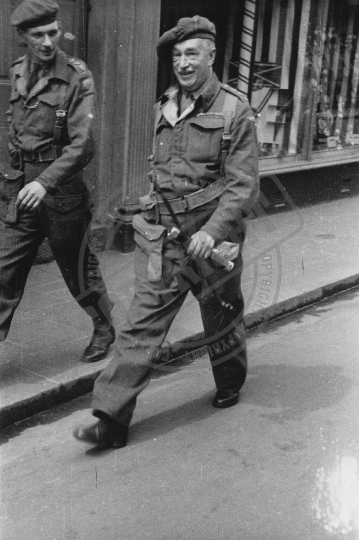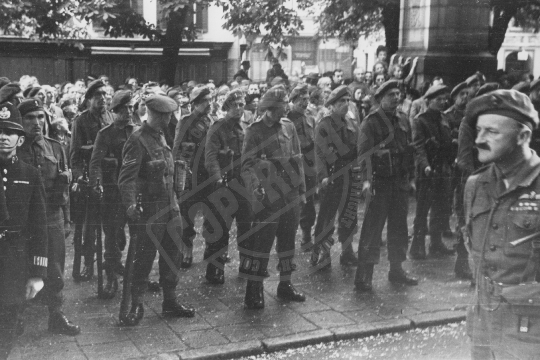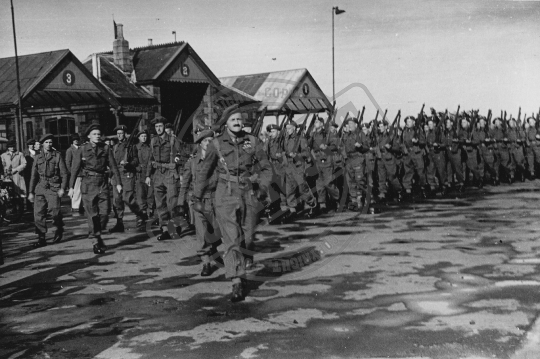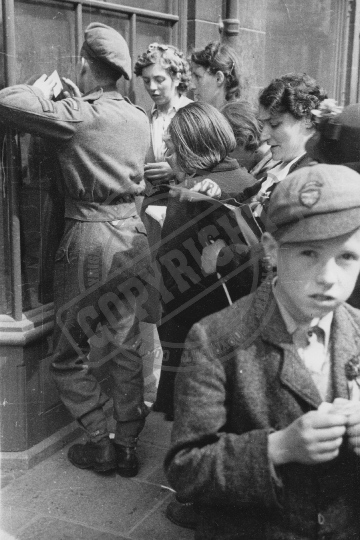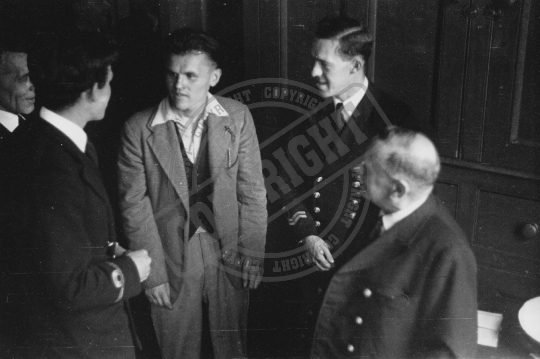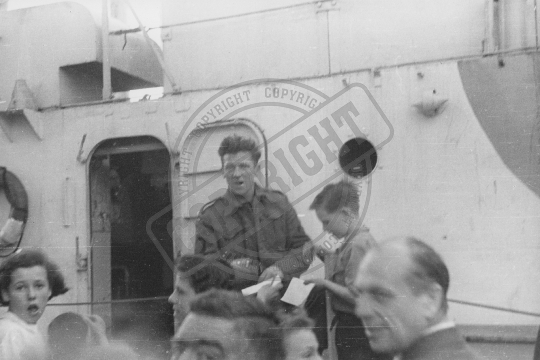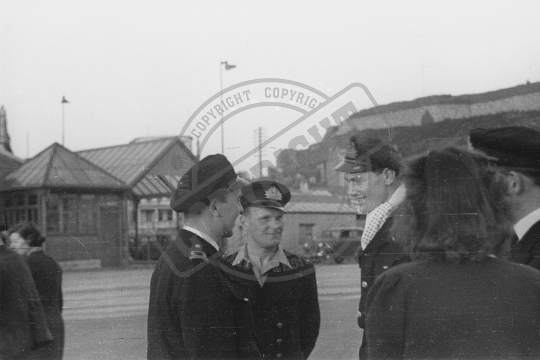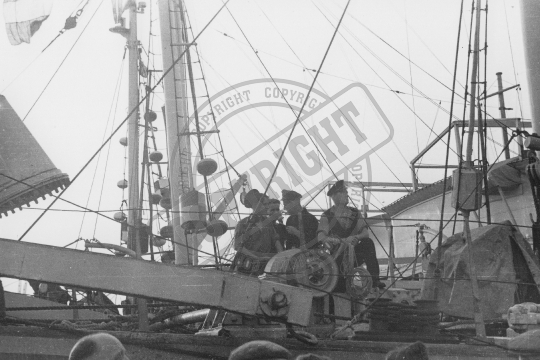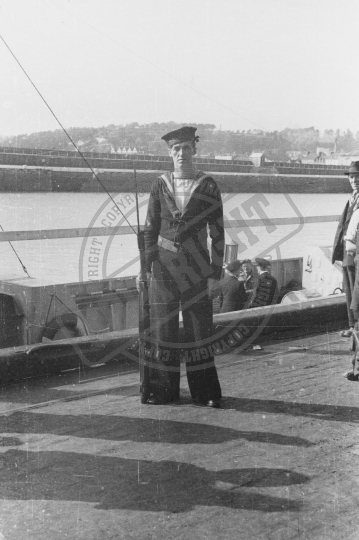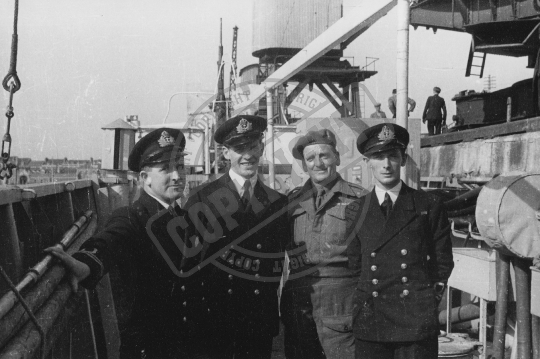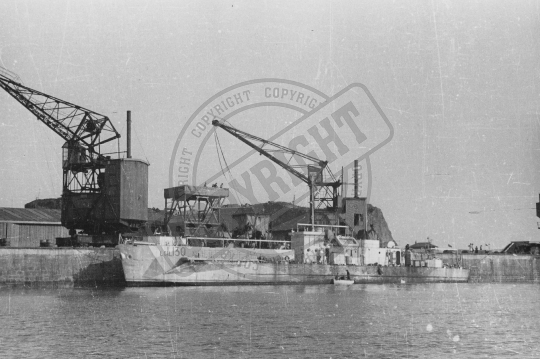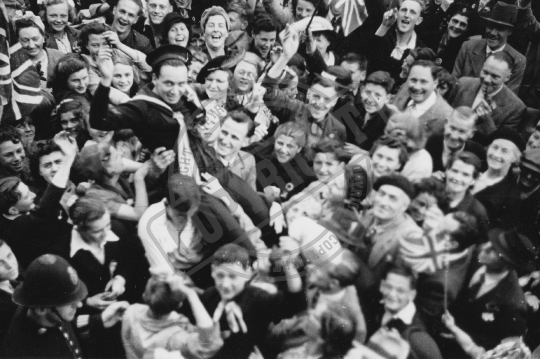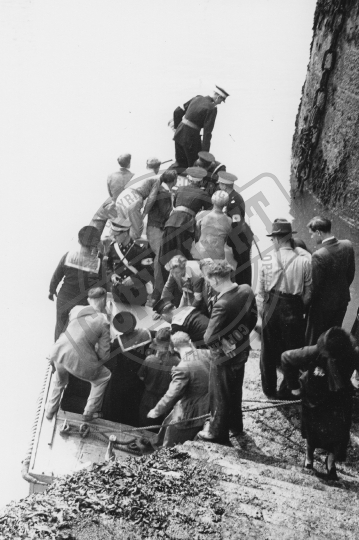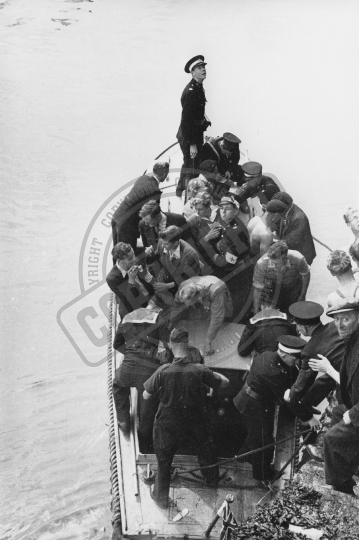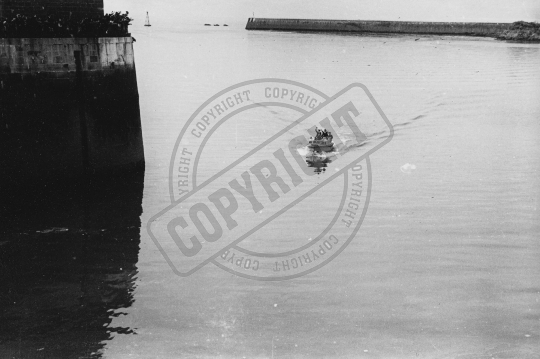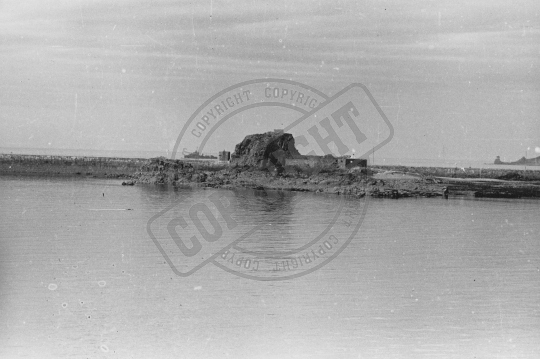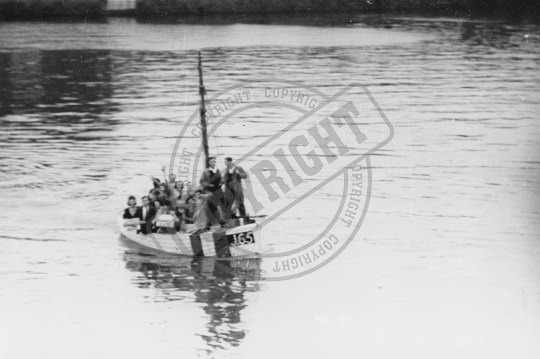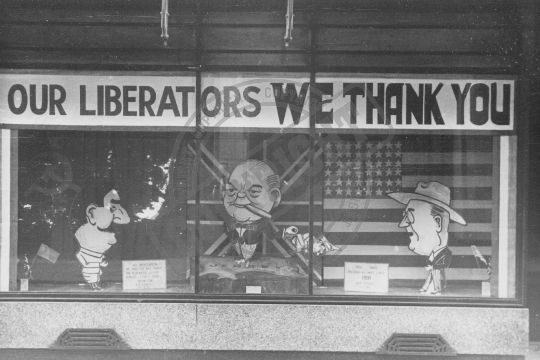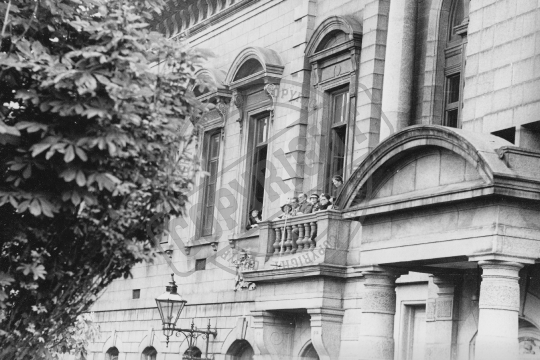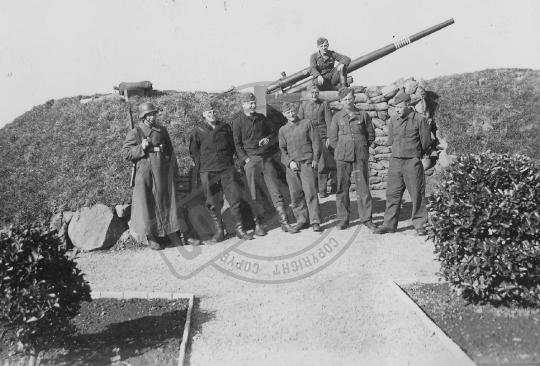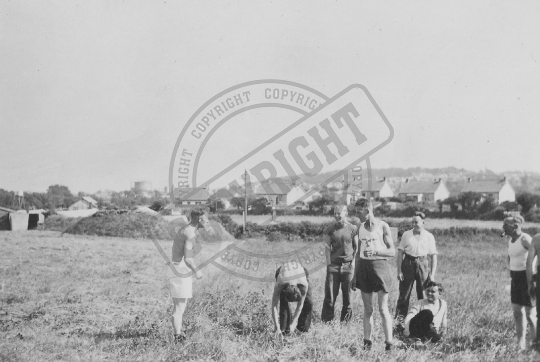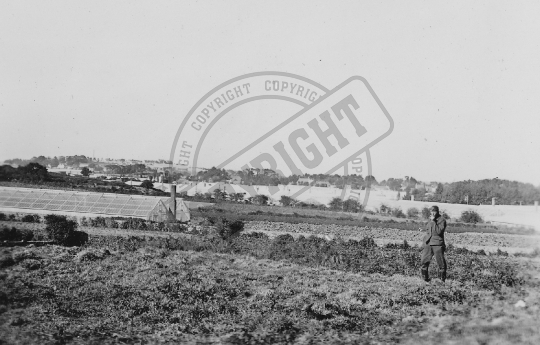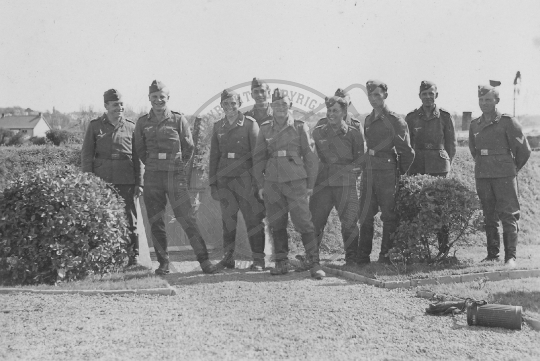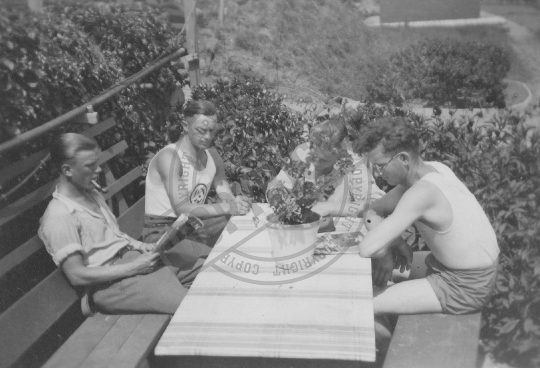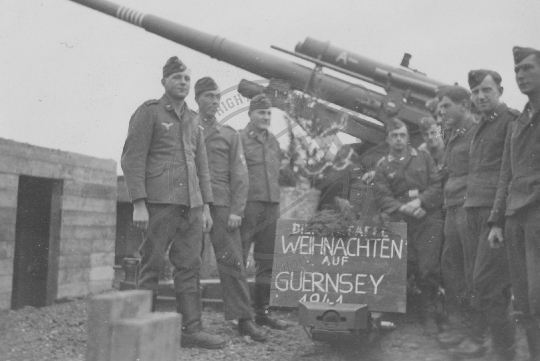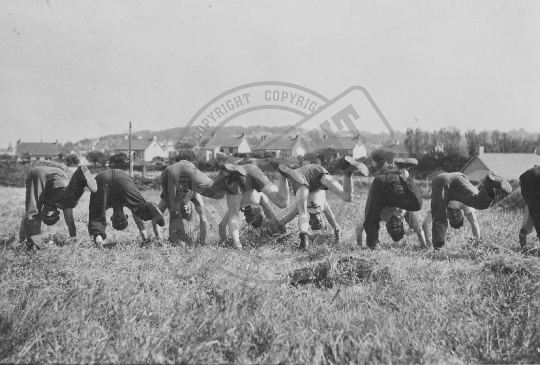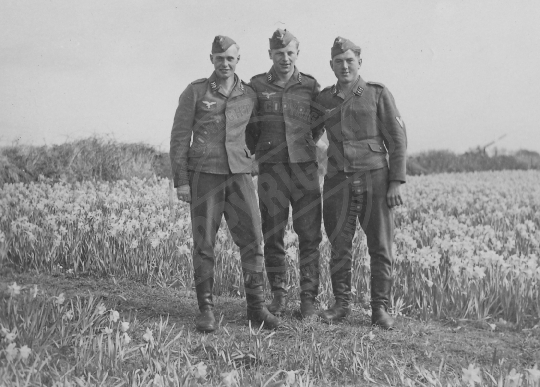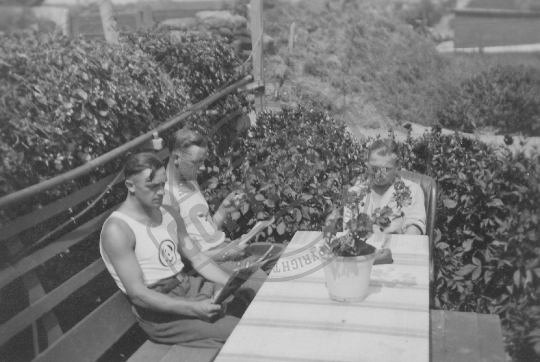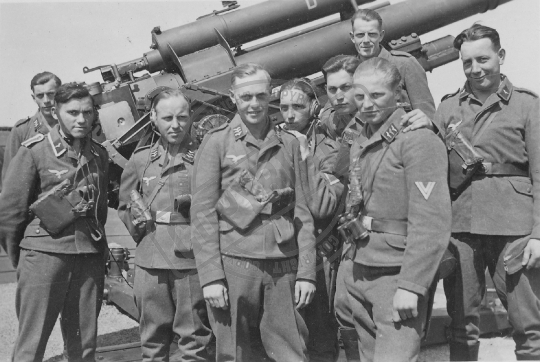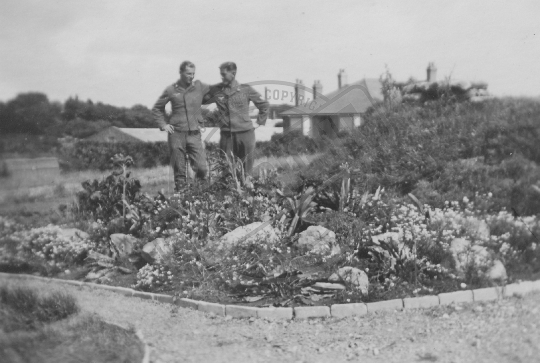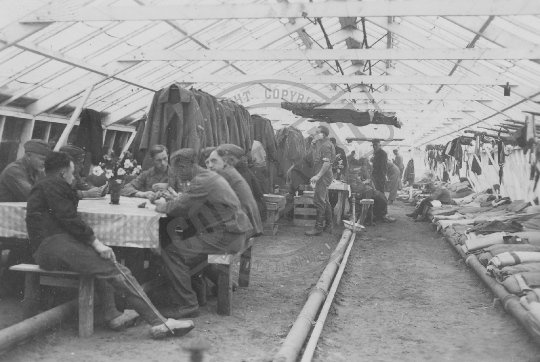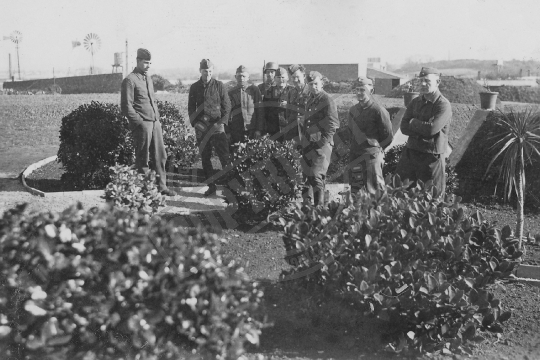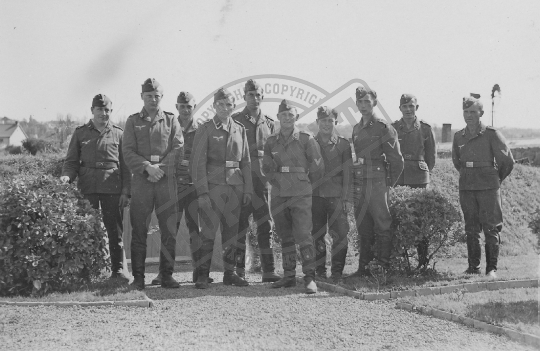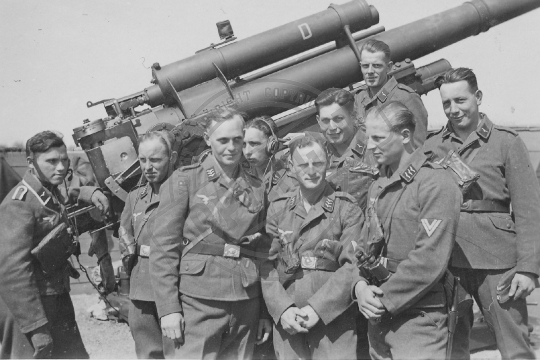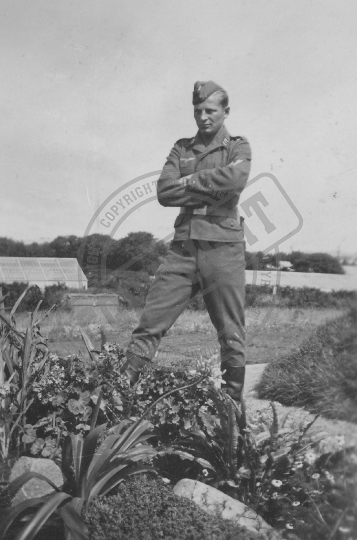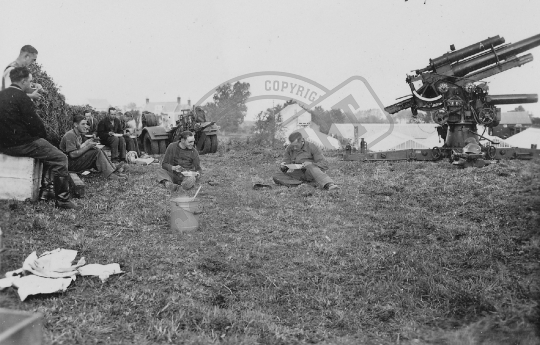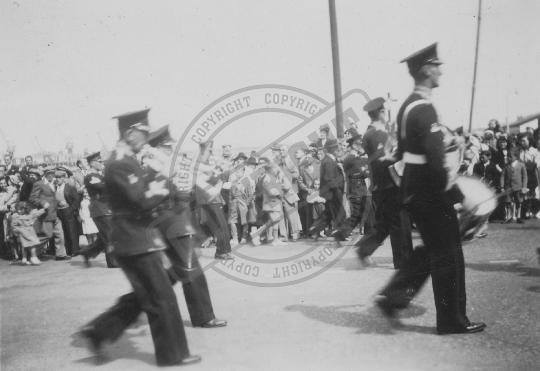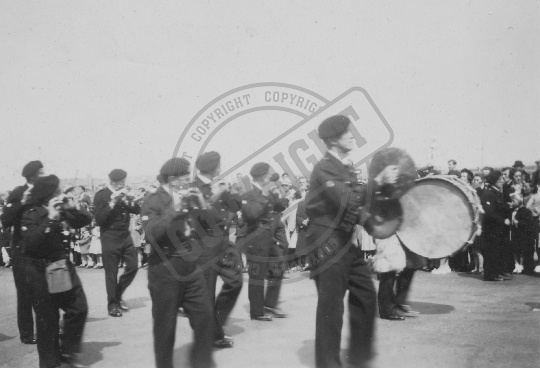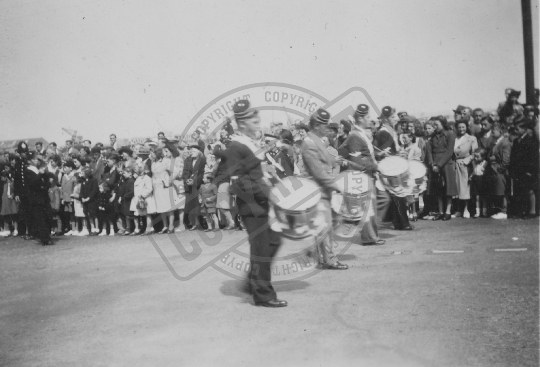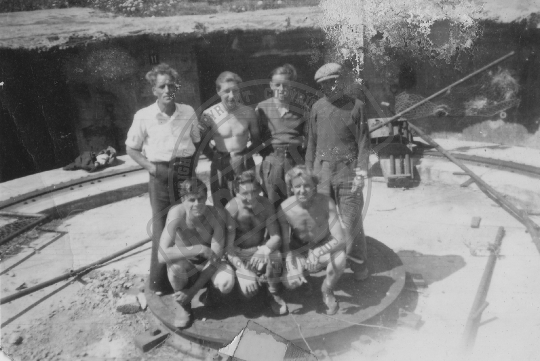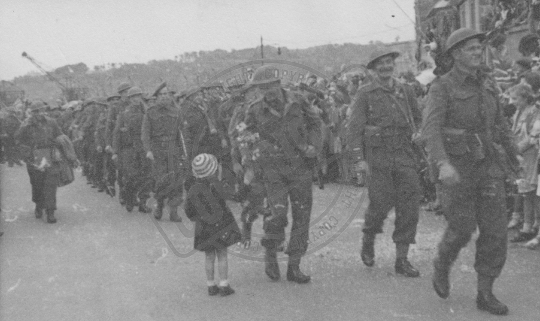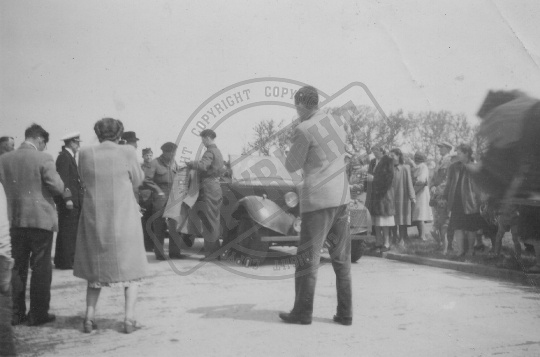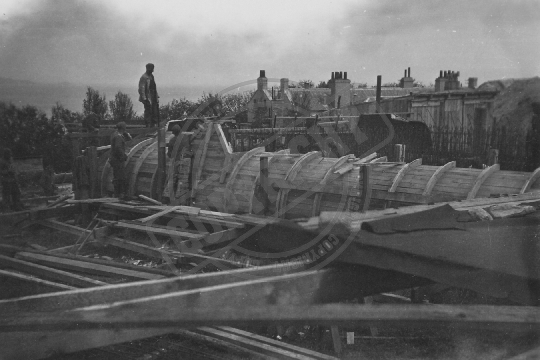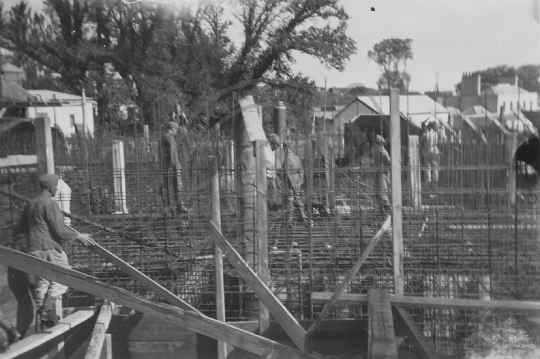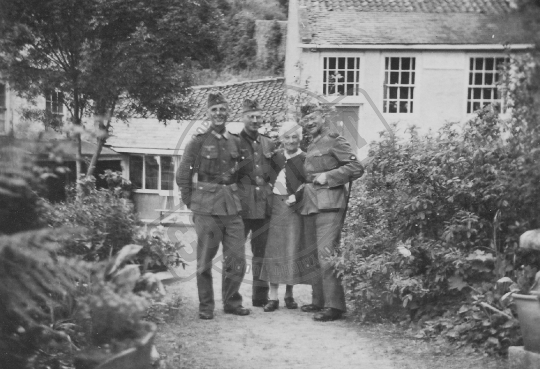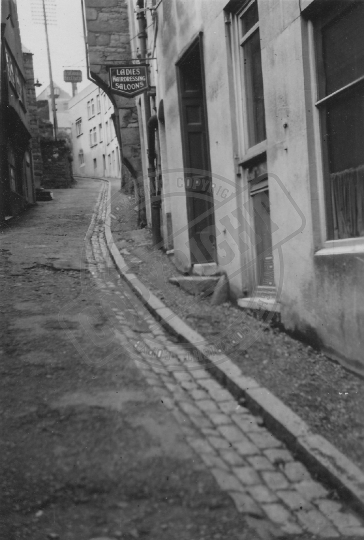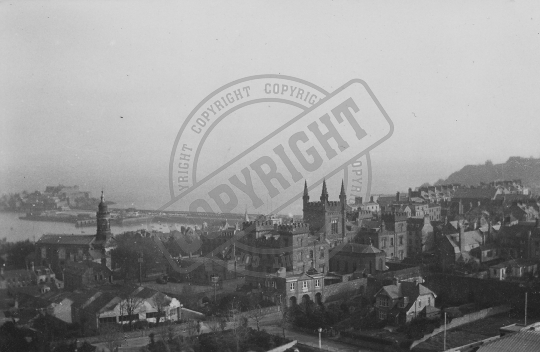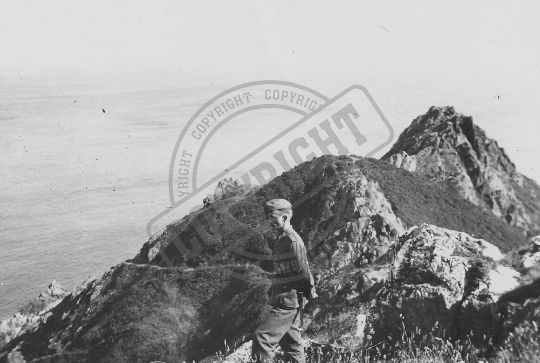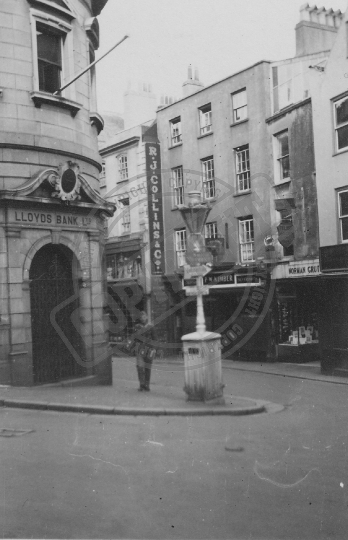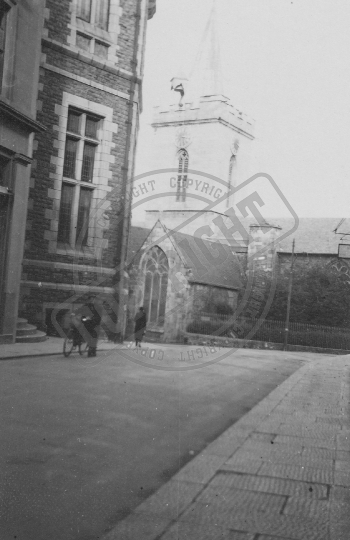Results (264)
CIMM_0070
Jersey Friday 11th May 1945. The Royal Court’s first sitting since the Liberation of Jersey assembled at 11 a.m. on Friday morning, 12 May 1945. In attendance were Force 135 officers including L to R; Captain L. Ogden, and Lt-Col W. Arnold, making their way through the streets of St Helier to the Court.
CIMM_0068
Jersey Thursday 10th May 1945. The Guard of Honour and the Islanders wait patiently in the Royal Square for the States Members to arrive for the Hoisting the Flag Ceremony. Lt-Col. Robinson, deep in thought, paces the pavement outside the States Buildings.
CIMM_0066
Jersey Thursday 10th May 1945. The Guard of Honour is marched off the Weighbridge led by Lt-Col Robinson and followed closely by Captain Le Brocq.
CIMM_0063
Jersey Thursday 10th May 1945. Jerseyman Corporal Alex Mangan was kept busy signing autographs for islanders in Conway Street, St Helier.
CIMM_0061
Jersey Liberation Wednesday 9th May 1945. After unfurling the Union Jack the two RN officers chat with a Russian worker (centre), Deputy Harbourmaster Bill Furzer (left) and Harbourmaster Captain Harry Richmond (right).
CIMM_0060
Jersey Liberation Wednesday 9th May 1945. Islanders crowded onto the LCI(L) 130 and asked the crew for autographs.
CIMM_0059
Jersey Liberation Wednesday 9th May 1945. Royal Navy officers from the LCI(L) 130 and minesweepers exchange details at the top of the New North Quay, St Helier Harbour, whilst a Jersey girl listens eagerly to their conversation.
CIMM_0058
Jersey Liberation Wednesday 9th May 1945. Once moored alongside the New North Quay crew members of one of the HM Motor minesweepers relax after clearing the approaches to St Helier Harbour. This minesweeper is most probably the FY PT 542 commanded by Lieutenant Idris Edwards, RNVR.
CIMM_0055
Jersey Liberation Wednesday 9th May 1945. One of two sentries that were posted to guard the mooring ropes, maintain discipline and ensure security of the vessel to prevent over enthusiastic islanders boarding the LCI(L) 130 and removing items as souvenirs.
CIMM_0054
Jersey Liberation Wednesday 9th May 1945. Officers of LCI(L) 130 with a Royal Engineer Major (third left) from the 'Omelette’ Advance Party. L to R; First Lieutenant (name unknown), RNVR; Sub.Lt. Jimmy Cooper, RNVR; and Commanding Officer, Lt Charles Sanders, RNVR.
CIMM_0053
The LCI(L) 130 moored alongside the New North Quay, St. Helier Harbour, Jersey. Almost immediately the main 'Omelette’ advance party of some 200 men began to land at 5pm on Wednesday 9th May.
CIMM_0050
A Royal Navy rating from HMS Beagle’s launch is also given a hero’s welcome by a group of Jersey islanders outside the Harbour Office at the Weighbridge.
CIMM_0048
The launch from HMS Beagle was swamped with autograph hunters at the end of the Albert Pier, Jersey.
CIMM_0047
The launch from HMS Beagle was swamped with autograph hunters at the end of the Albert Pier, Jersey. The sailor's supply of cigarettes rapidly diminished.
CIMM_0043
As the craft carrying the German Island Commander and the Bailiff of Jersey reached the head of Elizabeth Castle breakwater it was passed by the launch from HMS Beagle inward bound. As the launch passed through the pierheads the crowd could see that the men on board were wearing Royal Navy uniforms, and they let out loud cheers of welcome.
CIMM_0042
View looking across St. Aubin’s bay, Jersey from St. Helier Harbour. HMS Beagle can be seen at anchor behind Elizabeth Castle breakwater. One of the two square bunkers housing the firing points for the electrically detonated mines laid in the approaches to the harbour can be seen at the root of the castle breakwater.
CIMM_0040
One of the small boats that had made the trip to HMS Beagle anchored in St Aubin’s Bay, Jersey. On returning to St Helier Harbour two on board are holding up copies of the previous day’s newspapers announcing VE-Day, thrown to them by sailors on board the destroyer.
CIMM_0038
The RM Stores in King Street, St. Helier, Jersey featured the big three. Stalin, Churchill, and Roosevelt, with 'Winnie’, standing on a map of Jersey, holding up Hitler by the seat of his breeches.
CIMM_0037
Tuesday 8th May 1945, the Jersey Bailiff, Alexander Coutanche, had a microphone erected on the balcony of the Royal Court witness room, facing the Royal Square. After the Prime Minister’s speech he spoke from the balcony to the crowd.
SP_0048.jpg
The gun crew of Flak Batterie Kapellendorf located off Les Grandes Capelles in St Sampson. This battery of four 8.8cm Flak 18 guns which were used in an anti-aircraft role. This sequence of photographs were taken in December 1941. Note the kill markings on the gun barrel.
SP_0047.jpg
The gun crew of Flak Batterie Kapellendorf located off Les Grandes Capelles in St Sampson. This battery of four 8.8cm Flak 18 guns which were used in an anti-aircraft role. This sequence of photographs were taken in December 1941. Note the gas holders located at Le Bouet in the background.
SP_0046.jpg
Flak Batterie Kapellendorf located off Les Grandes Capelles in St Sampson. This battery of four 8.8cm Flak 18 guns which were used in an anti-aircraft role. This sequence of photographs were taken in December 1941.
SP_0045.jpg
The gun crew of Flak Batterie Kapellendorf located off Les Grandes Capelles in St Sampson. This battery of four 8.8cm Flak 18 guns which were used in an anti-aircraft role. This sequence of photographs were taken in December 1941.
SP_0044.jpg
The gun crew of Flak Batterie Kapellendorf located off Les Grandes Capelles in St Sampson. This battery of four 8.8cm Flak 18 guns which were used in an anti-aircraft role. This sequence of photographs were taken in December 1941. Note the Luftwaffe insignia on the PT shirts.
SP_0043.jpg
The gun crew of Flak Batterie Kapellendorf located off Les Grandes Capelles in St Sampson. This battery of four 8.8cm Flak 18 guns which were used in an anti-aircraft role. This sequence of photographs were taken at Christmas 1941.
SP_0042.jpg
The gun crew of Flak Batterie Kapellendorf located off Les Grandes Capelles in St Sampson. This battery of four 8.8cm Flak 18 guns which were used in an anti-aircraft role. This sequence of photographs were taken in December 1941.
SP_0040.jpg
The gun crew of Flak Batterie Kapellendorf located off Les Grandes Capelles in St Sampson. This battery of four 8.8cm Flak 18 guns which were used in an anti-aircraft role. This sequence of photographs were taken in December 1941.
SP_0038.jpg
The gun crew of Flak Batterie Kapellendorf located off Les Grandes Capelles in St Sampson. This battery of four 8.8cm Flak 18 guns which were used in an anti-aircraft role. This sequence of photographs were taken in December 1941. Note the Luftwaffe insignia on the PT shirts.
SP_0037.jpg
The gun crew of Flak Batterie Kapellendorf located off Les Grandes Capelles in St Sampson. This battery of four 8.8cm Flak 18 guns which were used in an anti-aircraft role. This sequence of photographs were taken in December 1941.
SP_0036.jpg
Flak Batterie Kapellendorf located off Les Grandes Capelles in St Sampson. This battery of four 8.8cm Flak 18 guns which were used in an anti-aircraft role. This sequence of photographs were taken in December 1941.
SP_0035.jpg
The gun crews of Flak Batterie Kapellendorf seen here inside a greenhouse which appears to also be the crews accommodation and rest area. Note the beds on the right and the uniforms hanging up to the left.
SP_0034.jpg
The gun crew of Flak Batterie Kapellendorf located off Les Grandes Capelles in St Sampson. This battery of four 8.8cm Flak 18 guns which were used in an anti-aircraft role. This sequence of photographs were taken in December 1941.
SP_0033.jpg
The gun crew of Flak Batterie Kapellendorf located off Les Grandes Capelles in St Sampson. This battery of four 8.8cm Flak 18 guns which were used in an anti-aircraft role. This sequence of photographs were taken in December 1941.
SP_0032.jpg
The gun crew of Flak Batterie Kapellendorf located off Les Grandes Capelles in St Sampson. This battery of four 8.8cm Flak 18 guns which were used in an anti-aircraft role. This sequence of photographs were taken in December 1941.
SP_0031.jpg
Flak Batterie Kapellendorf located off Les Grandes Capelles in St Sampson. This battery of four 8.8cm Flak 18 guns which were used in an anti-aircraft role. This sequence of photographs were taken in December 1941.
SP_0030.jpg
Flak Batterie Kapellendorf located off Les Grandes Capelles in St Sampson. This battery of four 8.8cm Flak 18 guns which were used in an anti-aircraft role. This sequence of photographs were taken in December 1941. Note the trailer for moving the gun in the background.
MT_0009
Big crowds gather on Liberation Day on May 9th 1946 to watch the procession in St Peter Port.
MT_0008
Big crowds gather on Liberation Day on May 9th 1946 to watch the procession in St Peter Port.
MT_0007
Big crowds gather on Liberation Day on May 9th 1946 to watch the procession in St Peter Port.
MT_0004
Victor Gontier a former internee at Laufen, seen here circa 1948 with a team from Gilroy’s which were engaged in backfilling trenches and salvaging scrap at Batterie Dollmann, Pleinmont.
MT_0002
Marching past the former White Heart Hotel sited opposite the Weighbridge, a young girl presents a pose of flowers to one of Guernsey’s Liberators on the occasion of the islands freedom on 9 May 1945.
MT_0005
Two years after Liberation on 23rd May 1947 Guernsey had a special visit from Field Marshall Bernard Montgomery (Monty). During his visit he met with many dignitaries including those from Elizabeth College, St John Ambulance, Sea Scouts and many others. His tour was welcomed by all with the streets of Guernsey lined with locals wanting to catch a glimpse of Monty. His famous vehicle known as Old Faithful carried him around the island and included a stop at the grounds of Beau Sejour.
OA_106
Shuttering and huge quantities of steel reinforcing surround construction workers as they prepare one of the many fortifications prior to concrete being poured in the grounds of Fort George.
OA_105
Shuttering and huge quantities of steel reinforcing surround construction workers as they prepare one of the many fortifications prior to concrete being poured in the grounds of Fort George.
OA_103
German soldiers with a local resident at entrance to the former Moulin Huet Watermill, one of the properties alongside the road leading down to Moulin Huet Bay.
OA_100
A view from the foot of Bertholet Street looking up the steeply graded hill that emerges onto New Street.
OA_098
A view across the roof tops of St Peter Port from Victoria Tower, with the spire of St James seen left, the square towers of Elizabeth College on the right and Castle Cornet in the far distance.
OA_093
A German soldier stands on the coastal footpath leading to Pointe De La Moye looking east towards Les Sommeilleuses.
OA_089
A typical stop for German troops seeking propaganda photographs featuring British institutions here outside Lloyds Bank located at the foot of Smith Street leading to the Pollet.
OA_088
At the foot of Fountain Street civilians are photographed going about their business, note the cyclist making their way up the road keeping to the right hand side.



